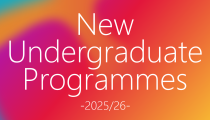Sept 2025 Entry
2 years
61
Applicants are expected to have good language skills.
What's New
Aims & Objectives
The Social Design specialism attempts to expand the scope of design beyond the current commercialized and compartmentalized professional practices by orienting towards the “social dimension of design”, with an emphasis on civic participation, social engagement and collaborative design practices. Dedicated to the promotion of social and cultural sustainability, the programme focuses on the realisation of social innovations and civic goals through the framework of design thinking and solution prototyping. The programme aims to:
- Augment students’ (empathic) understanding of social needs/changes from real-life perspectives.
- Introduce students to methods for social observation, ethnographic design research and co-designing practices.
- Engage students with outside partners to address social issues and develop design resolutions.
- Inaugurate designerly thinking into the professional practices of non-design disciplines.
- Prototype and realise design solutions for sustainable and positive social change.
Characteristics
Is Social Design for you?
If you are a committed and aspiring design learner with a humanitarian mindset, this specialism would suit you better. The programme aspires to breed a generation of well-rounded project coordinators, design collaborators and dynamic designers, who will become not only design practitioners, but consultants and change-makers in service of business and social needs.
Graduates of the BA (Hons) in Design (Social Design) are expected to become project or service designers and/or creative coordinators in the field of social and cultural business, non-governmental organizations (NGOs) and multidisciplinary design consultancies, etc.
Year 3 Pre-professional Collaborations
To research and apply knowledge and skills in real-life contexts: Students are expected to broaden their critical knowledge and analytical ability through contextual research, design thinking and integrate conceptual and technical skills into the development and communication of creative ideas and concrete propositions in certain real-life projects and other change-making opportunities.
Year 4 Integrative Design
To be collaborative, initiative and resourceful: Students are expected to incorporate knowledge, insights, design skills and social resources into creative and meaningful projects that will potentially generate positive impacts on societal systems. Students shall identify issues critical to future professional and social conditions and take the initiative to tackle them in collaboration with corresponding partners or stakeholders
Senior Year students are required to complete a total of 61 credits in order to graduate.
Additional 3 to 9 credits of English and/or Chinese language subject(s) for students not meeting the equivalent standard of the Undergraduate Degree LCR.
More information can be found here.
61
Scheme Leader
Gerhard Bruyns
BSc (Arch) MSc Urbanism TUD, PhD TUD
Programme Leader
Michael Chan
BSc (Arch), MArch
Applicants with an Associate Degree OR a Higher Diploma in Design/Design Studies, Social Sciences, Technology or related disciplines (e.g. Business Studies) from a recognised institution.
For further programme information, please contact:
The General Office
Tel: 2766 5488; email: nicola.yau@polyu.edu.hk
Tel: 2766 4353; email: jennifer.lo@polyu.edu.hk
Required
Copies of public examination result slip(s) demonstrating applicants' English language proficiency, e.g. HKDSE, HKALE, HKCEE, IELTS, TOFEL, etc. (for reference only)
-
To understand the attitude and potential of the applicants for the programme;
-
To ascertain whether their expectations match what the programme/career path can provide; and
-
To evaluate their learning commitment and their language, communication and interpersonal skills.
Aptitude/English written test and Interview with portfolio viewing (about 2-3 hours)
Applicants shall prepare their learning portfolio for the interview. Learning portfolio should reflect ones learning experience and achievement at school and in extra-curricular projects or activities.





